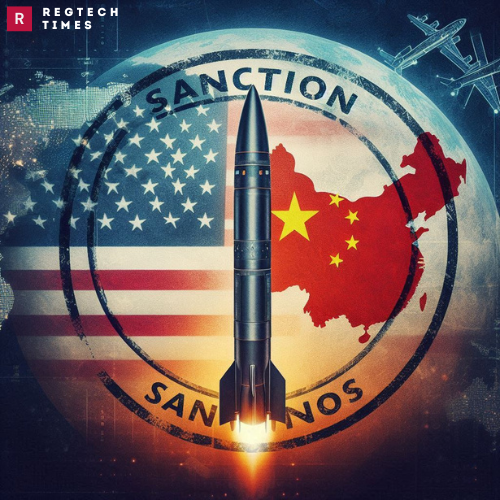The United States has imposed sanctions on several Chinese entities for their role in supporting Pakistan’s ballistic missile program, intensifying geopolitical tensions between Washington and Beijing.
The U.S. State Department announced on Thursday that it has imposed sanctions on a Chinese research institute and several companies for allegedly providing materials and technology to support Pakistan’s ballistic missile development. These measures target entities believed to be transferring equipment that could enhance Pakistan’s missile capabilities, including its Shaheen-3 and Ababeel ballistic missile systems. The sanctions reflect Washington’s ongoing efforts to curb the proliferation of ballistic missile technology worldwide.
Sanctions Target Chinese Support for Ballistic Missiles Program
The entities sanctioned include the Beijing Research Institute of Automation for Machine Building Industry, which is accused of collaborating with Pakistan to procure equipment for testing rocket motors used in its ballistic missiles, including the Shaheen-3 and Ababeel. These missiles form a critical part of Pakistan’s strategic arsenal, with the Shaheen-3 capable of hitting targets up to 2,750 kilometers away.
The sanctions additionally target three China-based companies — Hubei Huachangda Intelligent Equipment Co., Universal Enterprise, and Xi’an Longde Technology Development Co. — accused of supplying missile-related materials to Pakistan. Additionally, a Pakistan-based firm, Innovative Equipment, and a Chinese national were sanctioned for transferring materials restricted under international controls related to ballistic missiles technology.
U.S. Justification for Sanctions
State Department spokesperson Matthew Miller emphasized that the sanctions highlight the U.S. commitment to countering activities that promote the proliferation of ballistic missiles. Miller stated, “It is demonstrated by today’s actions that action will continue to be taken by the United States against proliferation and related procurement activities of concern, wherever they occur.”
Devastating Crisis: Sudan’s Extended Sanctions and Rising Suffering
The U.S. argues that these entities have “knowingly” facilitated the development of Pakistan’s ballistic missiles, thereby violating international norms regulating missile technology. The Shaheen-3 and Ababeel ballistic missiles are viewed as significant threats, especially in a region already fraught with nuclear tensions and strategic rivalries.
China’s Reaction to U.S. Sanctions
China has strongly opposed the U.S. sanctions, viewing them as an example of “long-arm jurisdiction” that lacks a legal basis under international law. Liu Pengyu, spokesperson for China’s embassy in Washington, said, “Unilateral sanctions and long-arm jurisdiction that lack a basis in international law or UN Security Council authorization are firmly opposed by China.” He further asserted that China would “firmly protect” the rights and interests of its companies and individuals affected by these sanctions.
China’s stance highlights a broader conflict over the interpretation and application of international laws concerning ballistic missiles and arms proliferation. While the U.S. sees these sanctions as necessary for preventing the spread of missile technology, China argues that they infringe upon its sovereignty and the legitimate business activities of its entities.
Implications of Sanctions and Regional Security
The U.S. decision to impose sanctions on Chinese entities comes amid growing strategic tensions between Washington and Beijing. The sanctions are likely to exacerbate these tensions, especially given the sensitive nature of ballistic missile technology.
Regionally, the U.S. aims to prevent the further development of Pakistan’s ballistic missiles, which are vital to its defense strategy against India. Both India and Pakistan are nuclear-armed neighbors with active ballistic missile programs, and their missile capabilities are central to their national security strategies.
By targeting the supply chains that support Pakistan’s missile development, the U.S. hopes to hinder Islamabad’s progress in enhancing its ballistic missile capabilities. The U.S. views the unchecked proliferation of such technology as a potential destabilizer in South Asia, a region with a history of military confrontations and geopolitical rivalry.
The sanctions emphasize the U.S. commitment to halting the spread of ballistic missile technology, which it views as a threat to both global and regional security. However, these actions also risk further complicating U.S.-China relations, already strained over strategic, economic, and political issues. As China pledges to protect its national interests and entities, the potential for diplomatic fallout remains significant, reflecting the complex challenges of managing non-proliferation in today’s geopolitical landscape.


